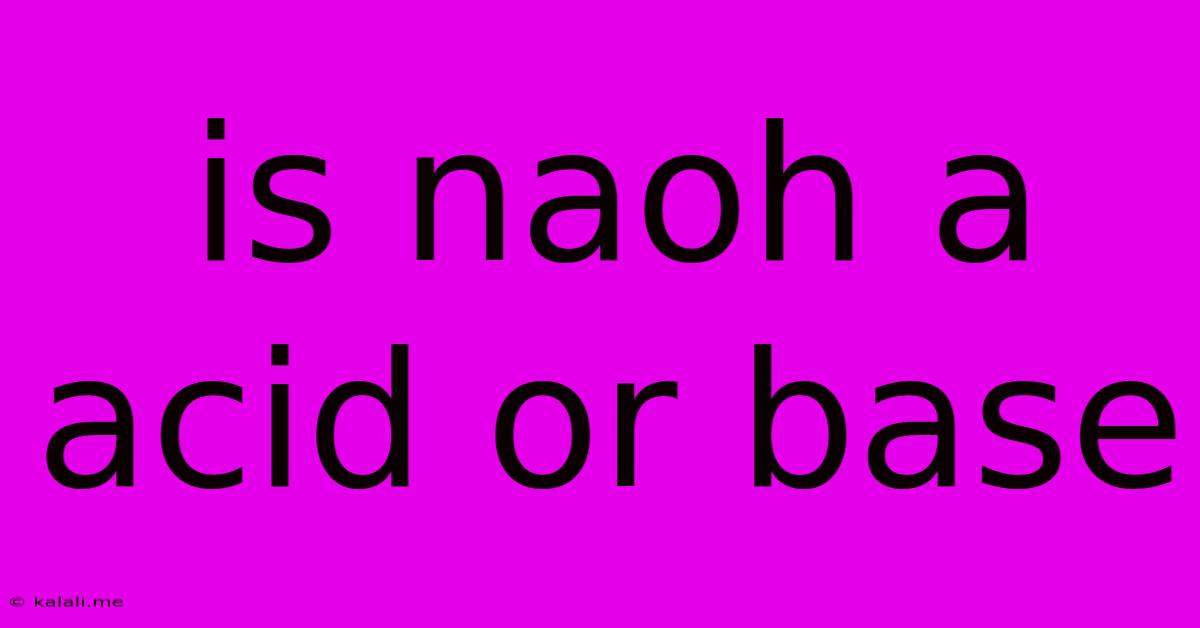Is Naoh A Acid Or Base
Kalali
Jun 03, 2025 · 3 min read

Table of Contents
Is NaOH an Acid or a Base? Understanding Sodium Hydroxide
This article will definitively answer the question: Is NaOH an acid or a base? We'll explore the properties of sodium hydroxide (NaOH), commonly known as lye or caustic soda, and explain its classification within the context of acid-base chemistry. Understanding this fundamental concept is crucial for anyone studying chemistry or working with chemicals in any capacity.
NaOH is a strong base. This is a fundamental fact in chemistry. Let's delve into why.
Understanding Acids and Bases
Before classifying NaOH, let's briefly review the definitions of acids and bases. Several theories exist, but the most relevant for this discussion are the Arrhenius and Brønsted-Lowry theories:
-
Arrhenius Theory: This theory defines acids as substances that produce hydrogen ions (H⁺) in aqueous solution, and bases as substances that produce hydroxide ions (OH⁻) in aqueous solution.
-
Brønsted-Lowry Theory: This broader theory defines acids as proton (H⁺) donors and bases as proton acceptors.
NaOH's Behavior in Solution
When sodium hydroxide (NaOH) dissolves in water, it dissociates completely into its constituent ions: sodium ions (Na⁺) and hydroxide ions (OH⁻). This complete dissociation is a characteristic of strong bases. The presence of a significant concentration of hydroxide ions (OH⁻) in solution is the defining characteristic that classifies NaOH as a base according to both the Arrhenius and Brønsted-Lowry theories.
The reaction looks like this:
NaOH(s) → Na⁺(aq) + OH⁻(aq)
The abundance of hydroxide ions directly increases the solution's pH, making it highly alkaline. This alkaline nature is a key indicator of its basic properties.
Properties of Strong Bases like NaOH
Strong bases like NaOH exhibit several key properties:
- High pH: Solutions containing NaOH have a pH significantly greater than 7.
- Reacts with acids: NaOH readily neutralizes acids in a reaction that produces salt and water. This is a classic acid-base neutralization reaction.
- Conducts electricity: The dissolved ions in an aqueous solution of NaOH allow it to conduct electricity effectively.
- Corrosive: NaOH is highly corrosive and can cause severe burns to skin and eyes. It requires careful handling and appropriate safety precautions.
Common Uses of NaOH
The strong basic nature of NaOH makes it useful in a wide range of applications, including:
- Chemical manufacturing: Used in the production of various chemicals, including soaps and detergents.
- Pulp and paper industry: Used in the process of making paper from wood pulp.
- Food processing: Used in food processing as a pH regulator and cleaning agent. (Note: Strict regulations govern its use in food applications to ensure safety).
- Drain cleaner: Its strong base properties make it effective in dissolving organic matter which clogs drains.
In conclusion, NaOH is unequivocally a strong base. Its complete dissociation in water, producing a high concentration of hydroxide ions, aligns perfectly with the definitions of bases according to both Arrhenius and Brønsted-Lowry theories. Its properties and widespread applications further reinforce this classification. Always remember to handle NaOH with extreme care due to its corrosive nature.
Latest Posts
Latest Posts
-
How To Wash A Duvet Cover
Jun 05, 2025
-
How Many Cups Of Powdered Sugar In 2 Lbs
Jun 05, 2025
-
Good Feats For Warlock Paladin Multi
Jun 05, 2025
-
Find The Function Represented By The Power Series
Jun 05, 2025
-
Can I Use A Laptop As A Monitor
Jun 05, 2025
Related Post
Thank you for visiting our website which covers about Is Naoh A Acid Or Base . We hope the information provided has been useful to you. Feel free to contact us if you have any questions or need further assistance. See you next time and don't miss to bookmark.